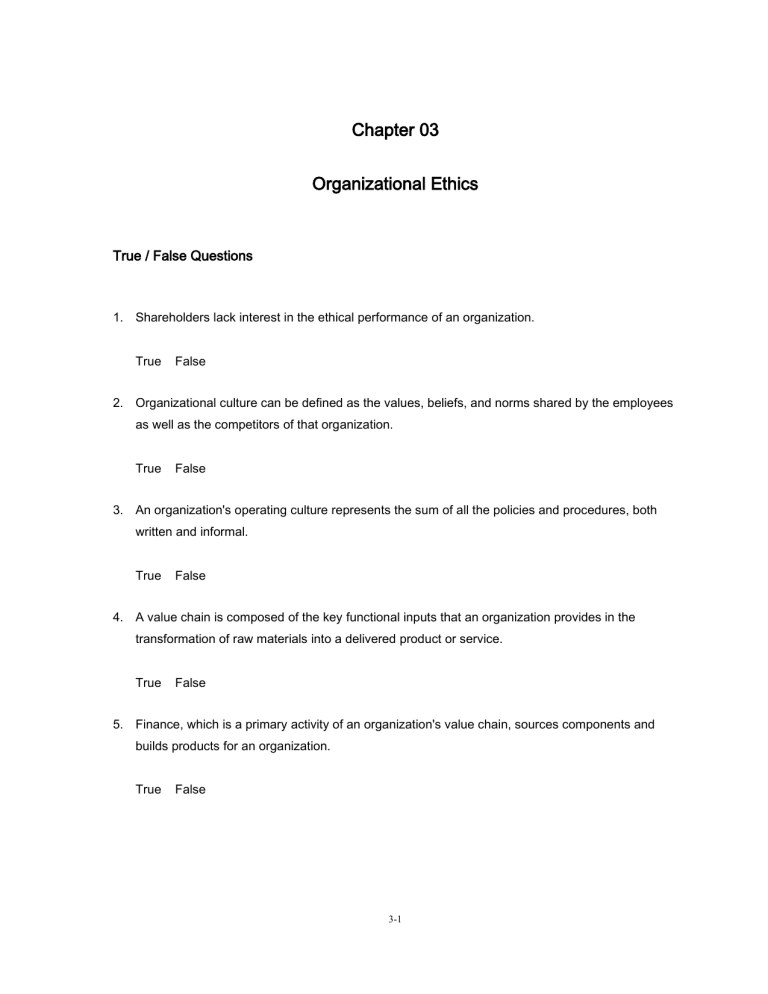
Chapter 03 Organizational Ethics True / False Questions 1. Shareholders lack interest in the ethical performance of an organization. True False 2. Organizational culture can be defined as the values, beliefs, and norms shared by the employees as well as the competitors of that organization. True False 3. An organization's operating culture represents the sum of all the policies and procedures, both written and informal. True False 4. A value chain is composed of the key functional inputs that an organization provides in the transformation of raw materials into a delivered product or service. True False 5. Finance, which is a primary activity of an organization's value chain, sources components and builds products for an organization. True False 3-1 6. Marketing, sales, and customer service are identified as the key functions in a value chain. True False 7. Marketing (and advertising) is one of the key functions in a value chain. True False 8. Distribution and marketing are line functions, supporting each of the key functional areas. True False 9. Information systems team coordinate the recruitment, training, and development of personnel for all aspects of an organization. True False 10. Research and development (R&D) professionals carry the responsibility for the future growth of an organization. True False 11. Given that research and development (R&D) teams do not interact directly with customers, the potential for ethical dilemmas is nonexistent. True False 12. For a research and development (R&D) team, the real ethical dilemmas come when decisions are made about product quality. True False 13. The manufacturing process is responsible for ensuring that a product reaches the hands of a satisfied customer. True False 3-2 14. Utilitarianism refers to the theory that suggests actions are taken out of duty and obligation to a purely moral ideal, rather than based on the needs of the situation. True False 15. Universal ethics refers to ethical choices that offer the greatest good for the greatest number of people. True False 16. Marketing professionals abide by a code of ethics adapted by the American Marketing Association. True False 17. The code of ethics adapted by the American Marketing Association speaks about improving "customer confidence in the integrity of the marketing exchange system." True False 18. The human resources function within an organization should ideally be directly involved in the marketing process of the organization. True False 19. The human resources function within an organization should ideally be directly involved in the maintenance of the technology in the organization. True False 20. The human resources function within an organization should ideally be directly involved in the creation of a career development program of an employee. True False 3-3 21. If an employee leaves a company, the human resources department is responsible for hosting an exit interview to ensure that anything that the organization can learn from the employee's departure is fed back into the company's strategic plan for future growth and development. True False 22. The human resources function within an organization seldom needs to be involved in the relationship between the company and an employee. True False 23. The advocates of ethical business conduct argue that an organization's marketing team should be at the center of any corporate code of ethics. True False 24. The advocates of ethical business conduct argue that an organization's human resources (HR) should be the sole creator of any corporate code of ethics. True False 25. An organization's human resources (HR) must ensure that the leadership selection and development processes include an ethics component. True False 26. An organization's human resources (HR) professionals must help ensure that ethics is a top organizational priority. True False 27. Marketing professionals are responsible for ensuring that the right programs and policies for ethical business conduct are in place. True False 3-4 28. The human resources function of an organization can be divided into three distinct areas: financial transactions, auditing, and accounting function. True False 29. The accounting function provides the certification, by an impartial third-party professional, that an organization's financial statements are accurate. True False 30. The auditing function keeps track of all the financial transactions of an organization by documenting the money coming in and money going out and balancing the accounts at the end of the period. True False 31. The accounting profession is governed by a set of laws and established legal precedents. True False 32. It is illegal to defer receipts from one quarter to the next to manage one's tax liabilities. True False 33. Some of the illegal financial functions carried out by an organization include underreporting income, overvaluing assets, and taking questionable deductions. True False 34. When a company's financial statements have been certified by an objective third-party to be "clean," that certification is meant to be for the public's benefit rather than the company's benefit. True False 3-5 35. The obligation that an auditing firm has to a paying client while owing an objective, third-party assessment of that client's financial stability to stakeholders and potential investors represents a potentially significant conflict of interest. True False 36. A situation in which one relationship or obligation places an individual or firm in direct conflict with an existing relationship or obligation refers to a conflict of interest. True False 37. Selling a product that has the potential to be harmful to a firm's customers represents a significant conflict of interest. True False 38. Nonprofit organizations do not face problems with unethical behavior. True False 39. Profits are the main reason behind stretching the truth and bending the rules that have become a regular occurrence in a workplace. True False 3-6



